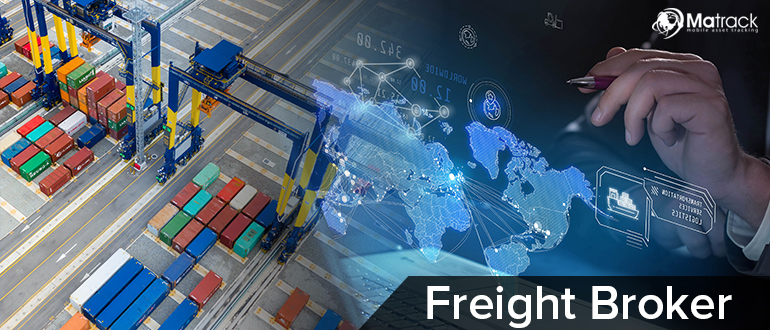Key Takeaways
- A freight broker acts as a middleman, connecting shippers with carriers to move goods efficiently.
- To start, you need proper licensing, business registration, and essential tools like load boards and TMS software.
- Building strong relationships with reliable carriers and shippers is crucial for steady business growth.
- With the right knowledge, planning, and persistence, you can establish a successful freight brokerage within 3 to 6 months.
What is a Freight Broker?
A freight broker is a middleman between businesses that need to ship goods and the trucking companies or carriers that move them. They help find the best shipping options, negotiate prices, and make sure deliveries go smoothly.
Freight brokers don’t own trucks or move cargo themselves. They simply coordinate shipments, using their connections and experience to get goods delivered efficiently and at the best cost.
Responsibilities of a Freight Broker
- Finding and vetting reliable carriers to ensure safe and timely deliveries.
- Negotiating pricing and contracts with both shippers and carriers.
- Scheduling shipments and coordinating pickup and delivery times.
- Tracking freight movement and keeping shippers updated on progress.
- Building and maintaining carrier relationships for long-term partnerships.
- Marketing services to attract and retain customers.
- Staying updated on industry trends and regulations to remain competitive.
Why Become a Freight Broker?
Becoming a freight broker offers several advantages:
- High Earning Potential – Brokers earn through commissions or margin differences, with the potential to make six-figure incomes.
- Low Startup Costs – Compared to other businesses, freight brokerage requires minimal capital investment.
- Work From Anywhere – You can operate from home, an office, or remotely.
- Growing Industry – The transportation sector is consistently expanding, with freight brokerage expected to grow significantly.
- No Need for Physical Assets – No trucks or warehouses are needed, reducing operational complexity.
8 Steps To Become a Freight Broker
Step 1: Learn About the Freight Industry
To become a successful freight broker, you need to understand how shipping and logistics work. This includes knowing about trucking laws, shipping routes, pricing, and supply chains.
Important Skills You’ll Need:
- Negotiation Skills – You’ll need to discuss rates with carriers and shippers.
- Communication Skills – You must clearly coordinate shipments with clients and truckers.
- Problem-Solving Skills – Unexpected delays happen, and you’ll need quick solutions.
- Sales & Marketing Skills – Finding and keeping customers is key to success.
- Analytical Thinking – Understanding market trends helps you set the right prices.
Ways to Learn:
- Work under an experienced freight broker.
- Take online courses in freight brokerage and logistics.
- Attend industry events and conferences.
- Read books and news about freight brokerage.
Step 2: Create a Business Plan
A business plan is your guide to starting and running your brokerage. It should include:
- Your Business Model – Will you specialize in a certain industry (e.g., food, retail, or auto parts)?
- Your Target Clients – Are you working with small businesses, large companies, or international shippers?
- Startup Costs – List expenses for licensing, software, office setup, and marketing.
- How You’ll Make Money – Will you earn through commissions or service fees?
- Competition Research – Study other freight brokers to find ways to stand out.
- Marketing Strategy – Plan how you’ll attract and keep customers.
A solid plan will also help you get funding if needed.
Step 3: Register Your Business and Get Licensed
To legally operate as a freight broker, you must register your business and obtain the required licenses.
1. Choose Your Business Type:
- Sole Proprietorship – Easy to start but offers no legal protection.
- Limited Liability Company (LLC) – Protects personal assets and is flexible.
- Corporation (Inc.) – Good for large brokerage firms but has more regulations.
Register your business with your state’s Secretary of State office.
2. Get a Motor Carrier (MC) Number:
All freight brokers must apply for an MC Number through the Federal Motor Carrier Safety Administration (FMCSA). You can do this online by completing the OP-1 form.
3. Obtain a Freight Broker Bond ($75,000):
This bond, known as a BMC-84 bond, protects carriers and shippers if a broker fails to pay them. The required amount is $75,000, but you only need to pay a small yearly fee (usually $900 to $2,000) based on your credit score.
Alternatively, you can use a BMC-85 Trust Fund Agreement, which requires you to deposit the full $75,000 in a bank trust account.
4. Get a USDOT Number:
A USDOT Number is required for FMCSA registration and helps track your business.
5. Appoint a Processing Agent (BOC-3):
A BOC-3 Processing Agent is needed for legal representation in every state where you operate. You can hire a service provider to handle this for you.
Step 4: Get the Right Software and Tools
Technology makes running a freight brokerage easier and more efficient.
Essential Tools:
- Transportation Management System (TMS) – Helps manage shipments, track loads, and handle paperwork.
- Load Boards – Websites like DAT and Truckstop help you find carriers.
- Freight Rate Calculators – Helps you set fair pricing.
- Customer Relationship Management (CRM) Software – Keeps track of client interactions.
- Accounting Software – Programs like QuickBooks or FreshBooks help manage invoices and payments.
Investing in these tools will improve your efficiency and service quality.
Step 5: Find Reliable Carriers
Your brokerage depends on working with trustworthy trucking companies to ensure shipments arrive on time.
How to Find Good Carriers:
- Use load boards to connect with trucking companies.
- Check carrier credentials on the FMCSA Carrier Database.
- Verify insurance coverage for legal compliance.
- Build relationships with owner-operators for consistent service.
A strong carrier network ensures competitive pricing and reliable service.
Step 6: Find Shippers and Get Clients
Finding shippers (businesses that need to transport goods) is one of the hardest but most important parts of being a freight broker.
Ways to Get Shippers:
- Cold Calling & Emails – Reach out to manufacturers, retailers, and wholesalers.
- Networking Events & Trade Shows – Attend industry events to meet potential clients.
- Social Media & LinkedIn – Connect with businesses online.
- Freight Directories – Use databases to find shippers looking for brokers.
- Referrals – Ask satisfied customers for recommendations.
Building relationships and staying persistent will help grow your business.
Step 7: Negotiate Contracts and Set Prices
Once you have shippers and carriers, you’ll need to negotiate fair rates and sign contracts.
Factors That Affect Pricing:
- Distance & Route – Longer trips and difficult routes cost more.
- Freight Type & Weight – Perishable or hazardous goods require special handling.
- Market Demand – Prices change based on seasonal demand and competition.
Use spot rates for one-time shipments and contract rates for long-term agreements. Make sure your contracts include payment terms, responsibilities, and service agreements.
Step 8: Manage Daily Operations and Stay Compliant
Running a freight brokerage involves tracking shipments, handling paperwork, solving issues, and following the law.
Key Tasks:
- Load Tracking – Use GPS to monitor shipments in real time.
- Document Management – Keep contracts, invoices, and agreements organized.
- Customer Service – Maintain clear communication with shippers and carriers.
- Regulatory Compliance – Follow FMCSA and DOT rules to avoid fines.
Good management leads to repeat business and a strong reputation.
How Long Does it Take to Become a Freight Broker?
Becoming a freight broker usually takes 3 to 6 months. Getting your license, including the MC number, BOC-3 filing, and broker bond, takes about 3 to 6 weeks.
Learning the industry and setting up your business can take a few weeks to a few months. If you already have experience, you may start in 1 to 2 months, but beginners should expect around 6 months to get fully established.
Conclusion
Becoming a freight broker is a great way to start a business with good income potential and low costs. By learning how the industry works, getting the right licenses, and using proper tools, you can set up a brokerage and connect shippers with carriers.
To succeed, you need to build strong relationships, set fair prices, and manage shipments efficiently. With hard work and persistence, you can grow your freight brokerage and start making steady profits in just a few months.



